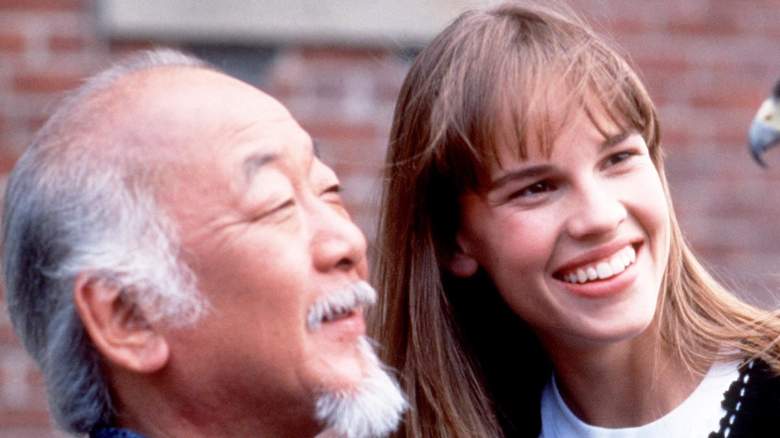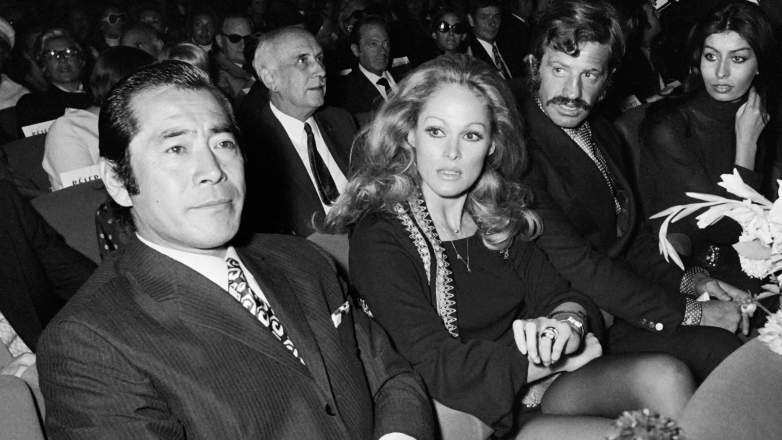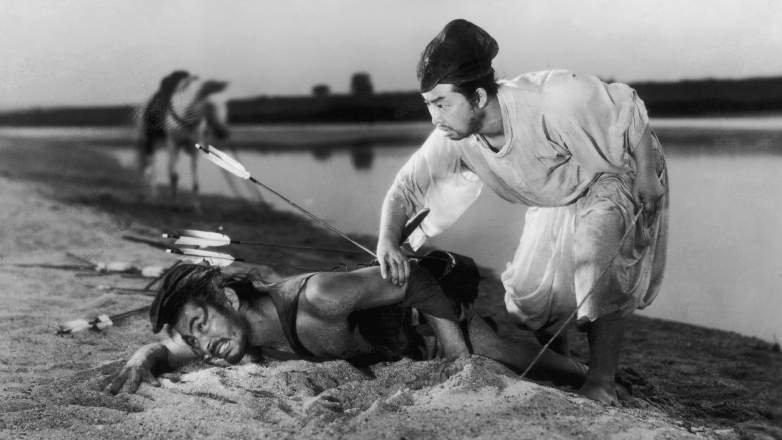
Getty Noriyuki "Pat" Morita and Hilary Swank share a scene in the movie "The Next Karate Kid."
Even though he passed away in 2005, Japanese-American actor Pat Morita is still heavily associated with the role of Mr. Miyagi in the Karate Kid film franchise. Since the first film’s premiere in 1984, the comedian received accolades for his portrayal of the sensei, and the character has become a cultural phenomenon.
However, Morita was not the first choice for the role. In the new documentary, More Than Miyagi, which premieres on February 5, Ralph Macchio recalled that the studio had someone else in mind.
Macchio Noted That the Studio Was Interested in Japanese Actor Toshiro Mifune

GettyToshiro Mifune sits with Ursula Andress and Jean-Paul Belmondo during the 1971 premiere of “Soleil Rouge.”
While being interviewed for the documentary, Macchio noted that while the original script was somewhat humorous, the jokes were “lightly, lightly peppered.” Instead of the kind, witty Miyagi that audiences have grown accustomed to, the studio was looking for someone who could depict a traditional sensei. In particular, they wanted the Japanese actor Toshiro Mifune, who appeared in numerous projects directed by acclaimed filmmaker Akira Kurosawa.
“They always spoke about this majestic Toshiro Mifune, Akira Kurosawa kind of this Japnese sensei that teaches the boy how to fight,” explained the actor.
He noted that the issue with Mifune was that he did not “really speak English.”
In 2020, Macchio shared a similar story while speaking to Vanity Fair for a video uploaded on the publications YouTube channel. He revealed that the film’s director, John Avildsen, wanted Morita, who was then most recognized for his role on Happy Days, to play the now-iconic character.
“The studio did not want him. The producer did not want him. I was like, ‘Arnold, from Happy Days?’ But John Avildsen was like, ‘I’ve read him and I’ve read you and I’m putting you guys in a room together,” said the father-of-two.
While Mifune was not cast as Mr. Miyagi, the late actor, who died in 1997 at the age of 77, is a celebrated performer. According to Black Belt magazine, Mifune was a prolific martial arts film star, appearing in movies like Sanjuro, Samurai Pirate, Samurai Assassin, Judo Saga, and Red Sun. The publication also noted that before becoming an actor in the late 1940s, Mifune “fought for the Japanese in World War II.”
A Documentary About Mifune Was Released in 2016

GettyToshiro Mifune and Daisuke Kato act in a scene together in the movie ‘Rashomon.”
In 2016, director Steven Okazaki released a documentary about the actor, titled Mifune: The Last Samurai. When the film premiered, Okazaki was interviewed by IndieWire. While talking to the publication, he noted that when researching he realized the actor shared similar attributes to his characters, stating,
I guess what surprised me was that he was pretty much the samurai he played on screen – gallant, noble, sometimes volatile, sweet, funny, and he liked to get drunk.
He also commented on the Mifune’s significance in film, even though he is not as recognized among “Western audiences.”
“They don’t realize what a huge influence the Kurosawa/Mifune films are on the movies they love – Star Wars and all the films influenced by that, Sergio Leone’s films and all the films influenced by him, The Magnificent Seven and all the films influenced by that,” explained the director.
Okazaki went on to say that Mifune’s importance stems from the fact he “was the first movie hero who wasn’t a white guy.”
“He didn’t demean himself or belittle his culture. And he didn’t take s*** from anyone. You look at him, and then you look at the way Asians are portrayed in most movies and television,” continued the filmmaker.
READ NEXT: Pat Morita’s Death: 5 Fast Facts You Need to Know
Comments
Who Is the Actor Who Almost Played Mr. Miyagi?